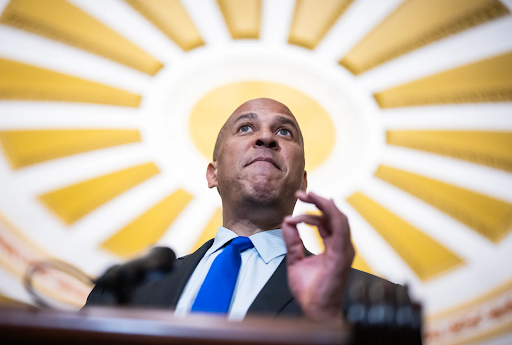
New Jersey Senator Cory Booker made history on April 1 by delivering the longest speech in the history of the U.S. Senate, lasting a total of 25 hours and 6 minutes, from March 31 at 7 p.m. all the way to 8 p.m. the following day. This act was a protest against the policies implemented during President Donald Trump’s current term in office, as well as the operations of the Department of Government Efficiency (DOGE), led by Elon Musk. Booker broke the record previously set by South Carolina Senator Strom Thurmond back in 1957, who was protesting the Civil Rights Act.
The U.S. Senate has no official time limit for debates. As long as a senator has been granted permission to speak during a session, they may do so indefinitely, so long as they remain standing. On March 31 at 7 p.m., Booker took to the podium and vowed to speak “for as long as I am physically able.” From that point on, he began a prolonged speech meant to obstruct progress in the assembly.
“I’ve been hearing from people all over my state and indeed all over the nation calling upon folks in Congress to do more, to do things that recognize the urgency, the crisis of the moment,” Booker said in a video posted to X prior to his speech. “And so we all have a responsibility, I believe, to do something different, to cause – as late Rep. John Lewis said – ‘good trouble,’ and that includes me.”
During his speech, Booker brought up several topics, including policies brought forward by the Trump Administration that he said show a “complete disregard for the rule of law, the Constitution, and the needs of the American people.”
He also discussed health care, Social Security, immigration, the economy, public education, free speech, and foreign policy. To support his argument, he included portions of letters that Booker said he had recently received from affected constituents, as well as public comments from world leaders. Following the marathon, he admitted that he fasted for several days prior to the speech, and didn’t rely on outside media such as children’s books, calling back to Ted Cruz’s 21-hour-long speech in 2013 where he famously read Green Eggs and Ham.
On Moravian’s campus, students expressed mixed feelings toward the act. Spectrum President Owen Levan-Uhler ’26 shared concerns about the timing of the filibuster, feeling as though it was a bit reductive.
“Speaking for 25 hours straight is notable, but if he truly cared about fighting back, he would’ve done it when it was advantageous,” he said. Levan-Uhler asked, “Where was this action weeks ago when the government was about to shut down?”
Others expressed pride in the act. “I find it impressive that someone cares so much about their beliefs that they could stand and speak for so long without breaks,” said Sophia Jezewski ‘28: “If someone is willing to take the time and commitment to do something, it deserves to be heard by everyone.”
In the end, Cory Booker’s filibuster demonstrates a unique approach that one can take in order to express their position on an issue. Whether it leads to a significant change or becomes one of many events in the ongoing political landscape remains to be seen. In a wider sense, Booker’s actions came off as a wake-up call and a reminder that the Freedom of Speech, the First Amendment itself, is not a passive right. It is an active responsibility, as he asked what we, as the American people, were willing to do to face current issues, even if it meant challenging the system.







